Importance of Emotional Intelligence in Management: A Tesco Analysis
VerifiedAdded on 2023/01/16
|18
|6197
|84
Report
AI Summary
This report delves into the critical role of emotional intelligence (EI) in the workplace, focusing on its impact on management communication and overall business benefits, using Tesco as a case study. The report begins by highlighting the importance of developing EI, emphasizing its relationship with effective communication and its contribution to achieving a competitive advantage. It explores how EI enhances relationships, fosters success, and influences leadership effectiveness within an organization. The report then examines various models of EI, including the ability, mixed, and trait models, providing a comprehensive understanding of their different approaches and applications. Furthermore, the report critically evaluates the significance of EI and mindfulness, offering insights into developing these skills to help organizations gain a competitive edge. The analysis covers self-awareness, emotional regulation, and empathy, emphasizing how these aspects of EI contribute to positive communication, improved teamwork, and overall organizational productivity. The report also discusses the link between EI and effective leadership, highlighting how emotionally intelligent leaders motivate others and build strong relationships. Ultimately, the report emphasizes the importance of EI in navigating conflicts, fostering a positive work environment, and achieving long-term business success.

Emotional Intelligence
Paraphrase This Document
Need a fresh take? Get an instant paraphrase of this document with our AI Paraphraser
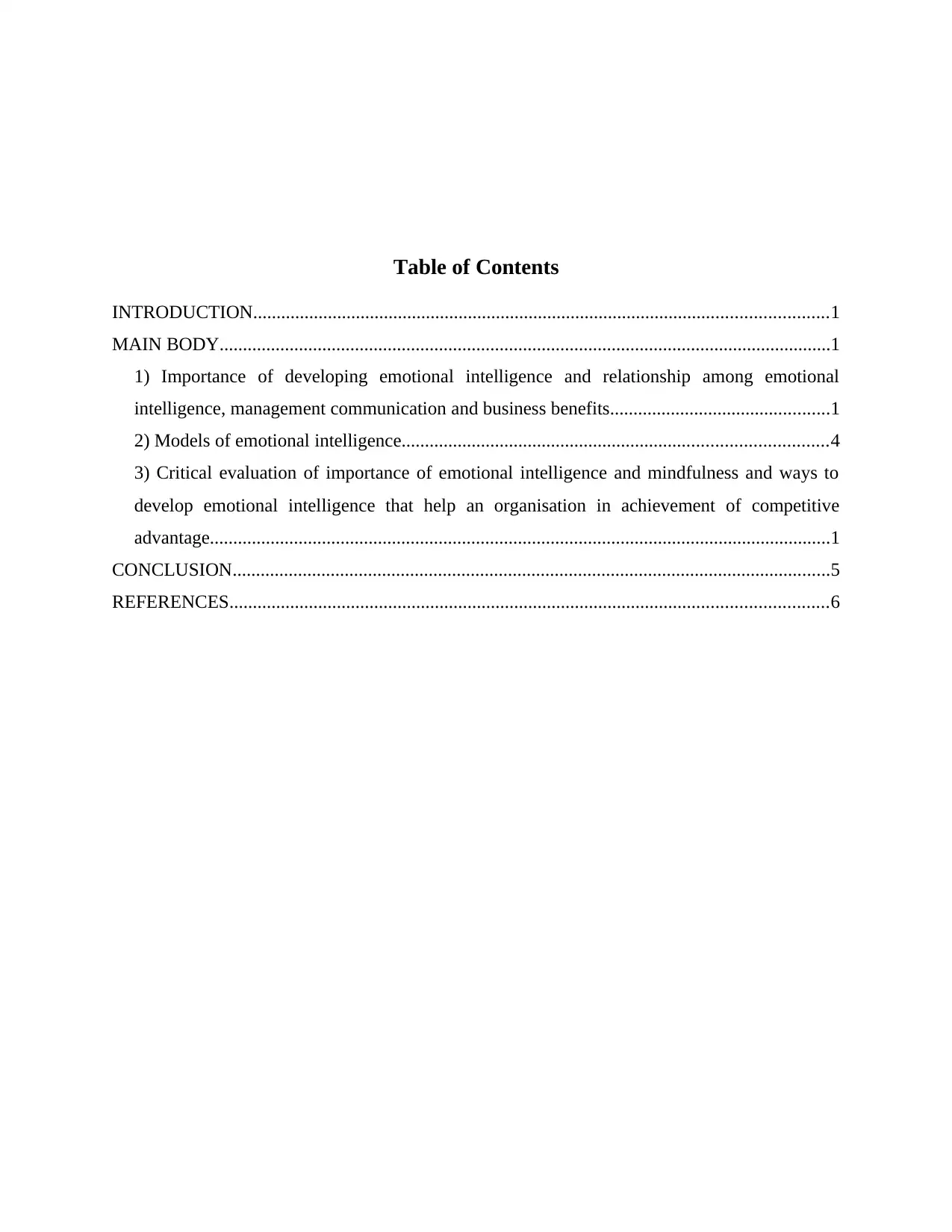
Table of Contents
INTRODUCTION...........................................................................................................................1
MAIN BODY...................................................................................................................................1
1) Importance of developing emotional intelligence and relationship among emotional
intelligence, management communication and business benefits...............................................1
2) Models of emotional intelligence...........................................................................................4
3) Critical evaluation of importance of emotional intelligence and mindfulness and ways to
develop emotional intelligence that help an organisation in achievement of competitive
advantage.....................................................................................................................................1
CONCLUSION................................................................................................................................5
REFERENCES................................................................................................................................6
INTRODUCTION...........................................................................................................................1
MAIN BODY...................................................................................................................................1
1) Importance of developing emotional intelligence and relationship among emotional
intelligence, management communication and business benefits...............................................1
2) Models of emotional intelligence...........................................................................................4
3) Critical evaluation of importance of emotional intelligence and mindfulness and ways to
develop emotional intelligence that help an organisation in achievement of competitive
advantage.....................................................................................................................................1
CONCLUSION................................................................................................................................5
REFERENCES................................................................................................................................6
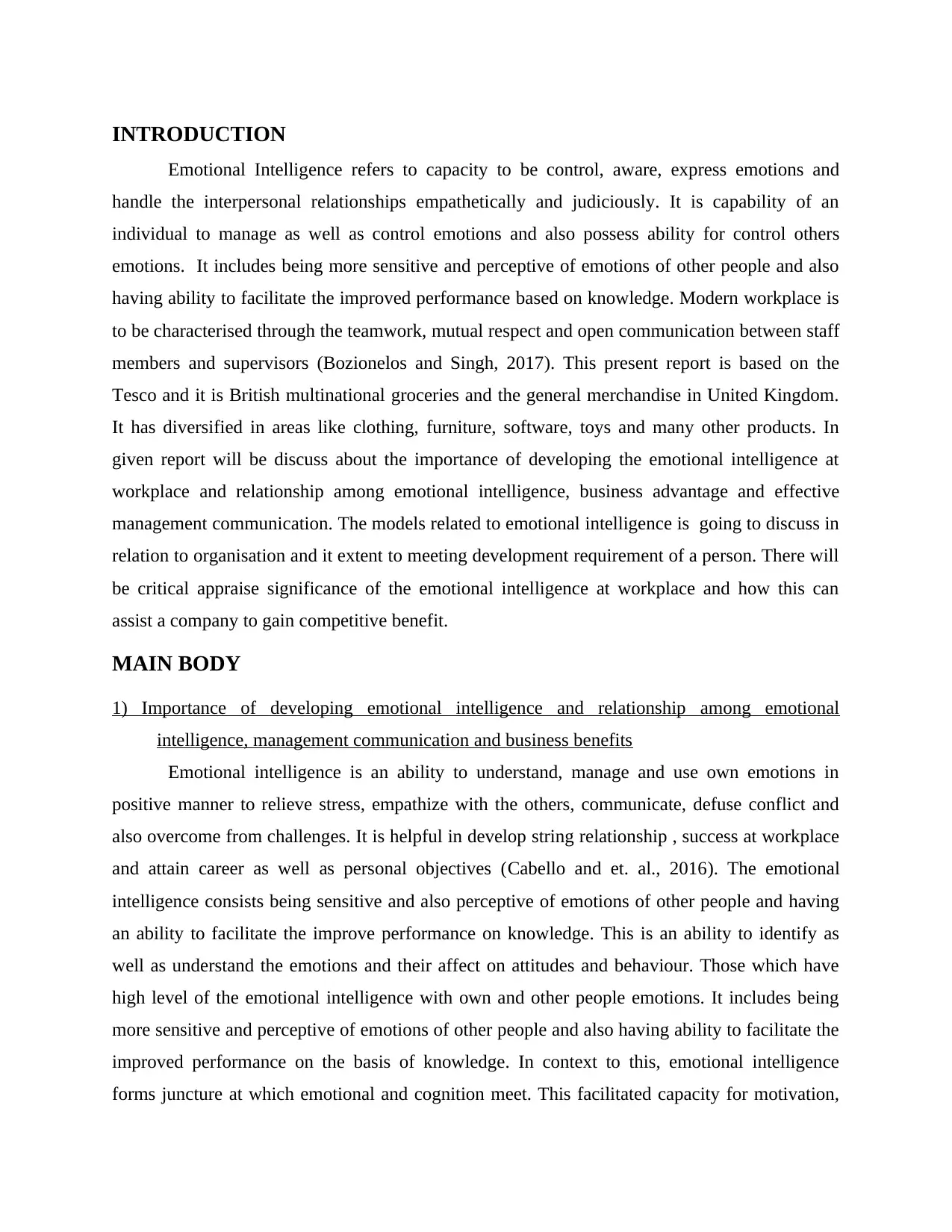
INTRODUCTION
Emotional Intelligence refers to capacity to be control, aware, express emotions and
handle the interpersonal relationships empathetically and judiciously. It is capability of an
individual to manage as well as control emotions and also possess ability for control others
emotions. It includes being more sensitive and perceptive of emotions of other people and also
having ability to facilitate the improved performance based on knowledge. Modern workplace is
to be characterised through the teamwork, mutual respect and open communication between staff
members and supervisors (Bozionelos and Singh, 2017). This present report is based on the
Tesco and it is British multinational groceries and the general merchandise in United Kingdom.
It has diversified in areas like clothing, furniture, software, toys and many other products. In
given report will be discuss about the importance of developing the emotional intelligence at
workplace and relationship among emotional intelligence, business advantage and effective
management communication. The models related to emotional intelligence is going to discuss in
relation to organisation and it extent to meeting development requirement of a person. There will
be critical appraise significance of the emotional intelligence at workplace and how this can
assist a company to gain competitive benefit.
MAIN BODY
1) Importance of developing emotional intelligence and relationship among emotional
intelligence, management communication and business benefits
Emotional intelligence is an ability to understand, manage and use own emotions in
positive manner to relieve stress, empathize with the others, communicate, defuse conflict and
also overcome from challenges. It is helpful in develop string relationship , success at workplace
and attain career as well as personal objectives (Cabello and et. al., 2016). The emotional
intelligence consists being sensitive and also perceptive of emotions of other people and having
an ability to facilitate the improve performance on knowledge. This is an ability to identify as
well as understand the emotions and their affect on attitudes and behaviour. Those which have
high level of the emotional intelligence with own and other people emotions. It includes being
more sensitive and perceptive of emotions of other people and also having ability to facilitate the
improved performance on the basis of knowledge. In context to this, emotional intelligence
forms juncture at which emotional and cognition meet. This facilitated capacity for motivation,
Emotional Intelligence refers to capacity to be control, aware, express emotions and
handle the interpersonal relationships empathetically and judiciously. It is capability of an
individual to manage as well as control emotions and also possess ability for control others
emotions. It includes being more sensitive and perceptive of emotions of other people and also
having ability to facilitate the improved performance based on knowledge. Modern workplace is
to be characterised through the teamwork, mutual respect and open communication between staff
members and supervisors (Bozionelos and Singh, 2017). This present report is based on the
Tesco and it is British multinational groceries and the general merchandise in United Kingdom.
It has diversified in areas like clothing, furniture, software, toys and many other products. In
given report will be discuss about the importance of developing the emotional intelligence at
workplace and relationship among emotional intelligence, business advantage and effective
management communication. The models related to emotional intelligence is going to discuss in
relation to organisation and it extent to meeting development requirement of a person. There will
be critical appraise significance of the emotional intelligence at workplace and how this can
assist a company to gain competitive benefit.
MAIN BODY
1) Importance of developing emotional intelligence and relationship among emotional
intelligence, management communication and business benefits
Emotional intelligence is an ability to understand, manage and use own emotions in
positive manner to relieve stress, empathize with the others, communicate, defuse conflict and
also overcome from challenges. It is helpful in develop string relationship , success at workplace
and attain career as well as personal objectives (Cabello and et. al., 2016). The emotional
intelligence consists being sensitive and also perceptive of emotions of other people and having
an ability to facilitate the improve performance on knowledge. This is an ability to identify as
well as understand the emotions and their affect on attitudes and behaviour. Those which have
high level of the emotional intelligence with own and other people emotions. It includes being
more sensitive and perceptive of emotions of other people and also having ability to facilitate the
improved performance on the basis of knowledge. In context to this, emotional intelligence
forms juncture at which emotional and cognition meet. This facilitated capacity for motivation,
⊘ This is a preview!⊘
Do you want full access?
Subscribe today to unlock all pages.

Trusted by 1+ million students worldwide
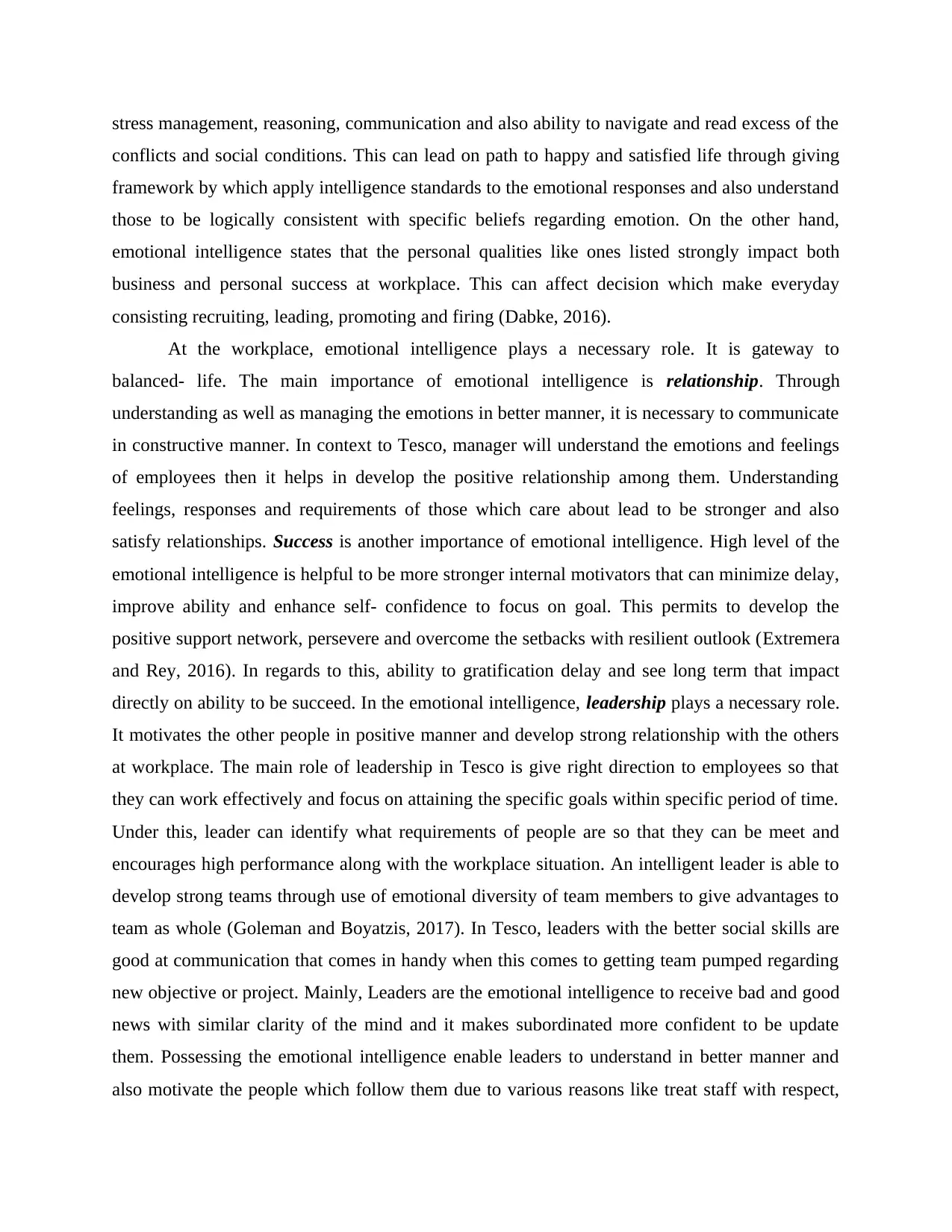
stress management, reasoning, communication and also ability to navigate and read excess of the
conflicts and social conditions. This can lead on path to happy and satisfied life through giving
framework by which apply intelligence standards to the emotional responses and also understand
those to be logically consistent with specific beliefs regarding emotion. On the other hand,
emotional intelligence states that the personal qualities like ones listed strongly impact both
business and personal success at workplace. This can affect decision which make everyday
consisting recruiting, leading, promoting and firing (Dabke, 2016).
At the workplace, emotional intelligence plays a necessary role. It is gateway to
balanced- life. The main importance of emotional intelligence is relationship. Through
understanding as well as managing the emotions in better manner, it is necessary to communicate
in constructive manner. In context to Tesco, manager will understand the emotions and feelings
of employees then it helps in develop the positive relationship among them. Understanding
feelings, responses and requirements of those which care about lead to be stronger and also
satisfy relationships. Success is another importance of emotional intelligence. High level of the
emotional intelligence is helpful to be more stronger internal motivators that can minimize delay,
improve ability and enhance self- confidence to focus on goal. This permits to develop the
positive support network, persevere and overcome the setbacks with resilient outlook (Extremera
and Rey, 2016). In regards to this, ability to gratification delay and see long term that impact
directly on ability to be succeed. In the emotional intelligence, leadership plays a necessary role.
It motivates the other people in positive manner and develop strong relationship with the others
at workplace. The main role of leadership in Tesco is give right direction to employees so that
they can work effectively and focus on attaining the specific goals within specific period of time.
Under this, leader can identify what requirements of people are so that they can be meet and
encourages high performance along with the workplace situation. An intelligent leader is able to
develop strong teams through use of emotional diversity of team members to give advantages to
team as whole (Goleman and Boyatzis, 2017). In Tesco, leaders with the better social skills are
good at communication that comes in handy when this comes to getting team pumped regarding
new objective or project. Mainly, Leaders are the emotional intelligence to receive bad and good
news with similar clarity of the mind and it makes subordinated more confident to be update
them. Possessing the emotional intelligence enable leaders to understand in better manner and
also motivate the people which follow them due to various reasons like treat staff with respect,
conflicts and social conditions. This can lead on path to happy and satisfied life through giving
framework by which apply intelligence standards to the emotional responses and also understand
those to be logically consistent with specific beliefs regarding emotion. On the other hand,
emotional intelligence states that the personal qualities like ones listed strongly impact both
business and personal success at workplace. This can affect decision which make everyday
consisting recruiting, leading, promoting and firing (Dabke, 2016).
At the workplace, emotional intelligence plays a necessary role. It is gateway to
balanced- life. The main importance of emotional intelligence is relationship. Through
understanding as well as managing the emotions in better manner, it is necessary to communicate
in constructive manner. In context to Tesco, manager will understand the emotions and feelings
of employees then it helps in develop the positive relationship among them. Understanding
feelings, responses and requirements of those which care about lead to be stronger and also
satisfy relationships. Success is another importance of emotional intelligence. High level of the
emotional intelligence is helpful to be more stronger internal motivators that can minimize delay,
improve ability and enhance self- confidence to focus on goal. This permits to develop the
positive support network, persevere and overcome the setbacks with resilient outlook (Extremera
and Rey, 2016). In regards to this, ability to gratification delay and see long term that impact
directly on ability to be succeed. In the emotional intelligence, leadership plays a necessary role.
It motivates the other people in positive manner and develop strong relationship with the others
at workplace. The main role of leadership in Tesco is give right direction to employees so that
they can work effectively and focus on attaining the specific goals within specific period of time.
Under this, leader can identify what requirements of people are so that they can be meet and
encourages high performance along with the workplace situation. An intelligent leader is able to
develop strong teams through use of emotional diversity of team members to give advantages to
team as whole (Goleman and Boyatzis, 2017). In Tesco, leaders with the better social skills are
good at communication that comes in handy when this comes to getting team pumped regarding
new objective or project. Mainly, Leaders are the emotional intelligence to receive bad and good
news with similar clarity of the mind and it makes subordinated more confident to be update
them. Possessing the emotional intelligence enable leaders to understand in better manner and
also motivate the people which follow them due to various reasons like treat staff with respect,
Paraphrase This Document
Need a fresh take? Get an instant paraphrase of this document with our AI Paraphraser
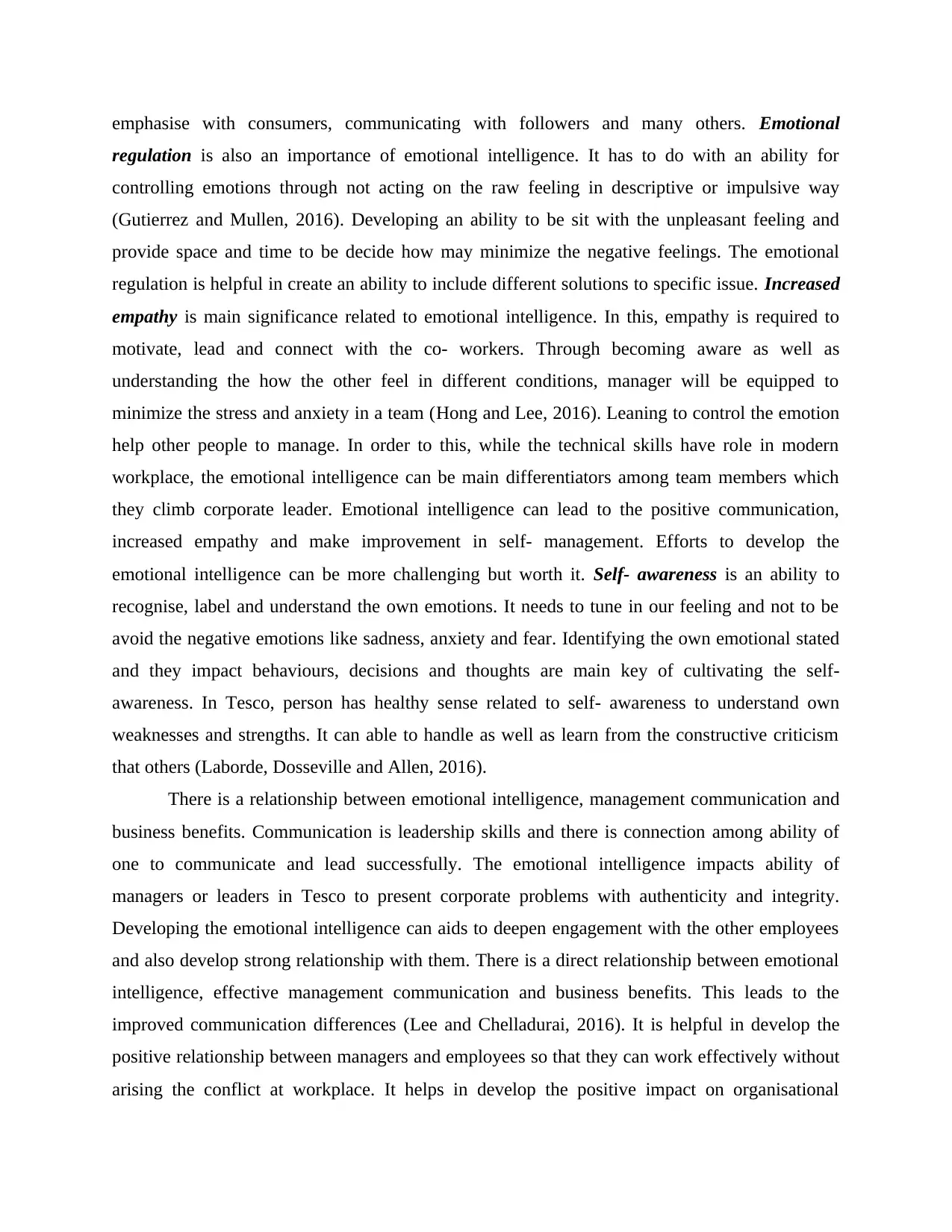
emphasise with consumers, communicating with followers and many others. Emotional
regulation is also an importance of emotional intelligence. It has to do with an ability for
controlling emotions through not acting on the raw feeling in descriptive or impulsive way
(Gutierrez and Mullen, 2016). Developing an ability to be sit with the unpleasant feeling and
provide space and time to be decide how may minimize the negative feelings. The emotional
regulation is helpful in create an ability to include different solutions to specific issue. Increased
empathy is main significance related to emotional intelligence. In this, empathy is required to
motivate, lead and connect with the co- workers. Through becoming aware as well as
understanding the how the other feel in different conditions, manager will be equipped to
minimize the stress and anxiety in a team (Hong and Lee, 2016). Leaning to control the emotion
help other people to manage. In order to this, while the technical skills have role in modern
workplace, the emotional intelligence can be main differentiators among team members which
they climb corporate leader. Emotional intelligence can lead to the positive communication,
increased empathy and make improvement in self- management. Efforts to develop the
emotional intelligence can be more challenging but worth it. Self- awareness is an ability to
recognise, label and understand the own emotions. It needs to tune in our feeling and not to be
avoid the negative emotions like sadness, anxiety and fear. Identifying the own emotional stated
and they impact behaviours, decisions and thoughts are main key of cultivating the self-
awareness. In Tesco, person has healthy sense related to self- awareness to understand own
weaknesses and strengths. It can able to handle as well as learn from the constructive criticism
that others (Laborde, Dosseville and Allen, 2016).
There is a relationship between emotional intelligence, management communication and
business benefits. Communication is leadership skills and there is connection among ability of
one to communicate and lead successfully. The emotional intelligence impacts ability of
managers or leaders in Tesco to present corporate problems with authenticity and integrity.
Developing the emotional intelligence can aids to deepen engagement with the other employees
and also develop strong relationship with them. There is a direct relationship between emotional
intelligence, effective management communication and business benefits. This leads to the
improved communication differences (Lee and Chelladurai, 2016). It is helpful in develop the
positive relationship between managers and employees so that they can work effectively without
arising the conflict at workplace. It helps in develop the positive impact on organisational
regulation is also an importance of emotional intelligence. It has to do with an ability for
controlling emotions through not acting on the raw feeling in descriptive or impulsive way
(Gutierrez and Mullen, 2016). Developing an ability to be sit with the unpleasant feeling and
provide space and time to be decide how may minimize the negative feelings. The emotional
regulation is helpful in create an ability to include different solutions to specific issue. Increased
empathy is main significance related to emotional intelligence. In this, empathy is required to
motivate, lead and connect with the co- workers. Through becoming aware as well as
understanding the how the other feel in different conditions, manager will be equipped to
minimize the stress and anxiety in a team (Hong and Lee, 2016). Leaning to control the emotion
help other people to manage. In order to this, while the technical skills have role in modern
workplace, the emotional intelligence can be main differentiators among team members which
they climb corporate leader. Emotional intelligence can lead to the positive communication,
increased empathy and make improvement in self- management. Efforts to develop the
emotional intelligence can be more challenging but worth it. Self- awareness is an ability to
recognise, label and understand the own emotions. It needs to tune in our feeling and not to be
avoid the negative emotions like sadness, anxiety and fear. Identifying the own emotional stated
and they impact behaviours, decisions and thoughts are main key of cultivating the self-
awareness. In Tesco, person has healthy sense related to self- awareness to understand own
weaknesses and strengths. It can able to handle as well as learn from the constructive criticism
that others (Laborde, Dosseville and Allen, 2016).
There is a relationship between emotional intelligence, management communication and
business benefits. Communication is leadership skills and there is connection among ability of
one to communicate and lead successfully. The emotional intelligence impacts ability of
managers or leaders in Tesco to present corporate problems with authenticity and integrity.
Developing the emotional intelligence can aids to deepen engagement with the other employees
and also develop strong relationship with them. There is a direct relationship between emotional
intelligence, effective management communication and business benefits. This leads to the
improved communication differences (Lee and Chelladurai, 2016). It is helpful in develop the
positive relationship between managers and employees so that they can work effectively without
arising the conflict at workplace. It helps in develop the positive impact on organisational
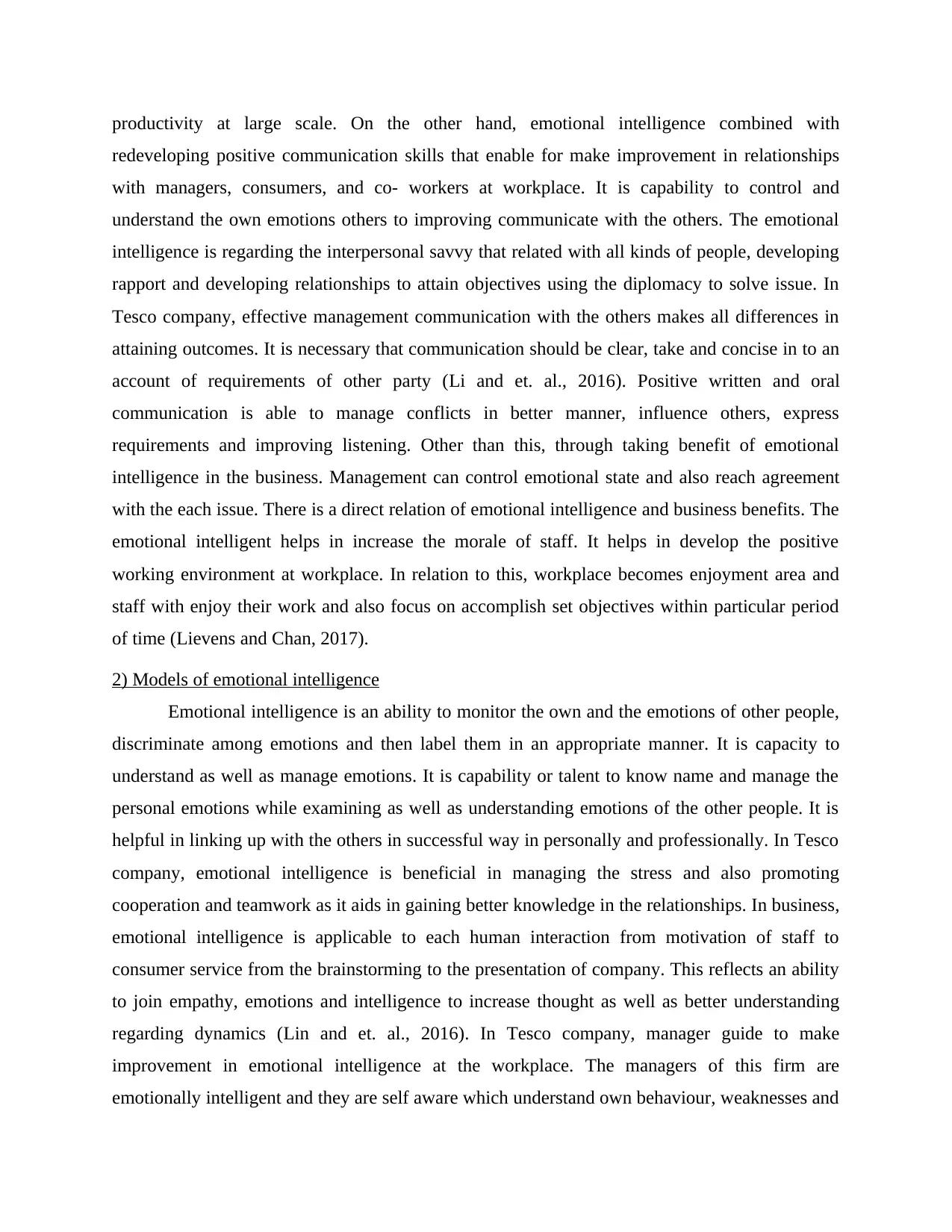
productivity at large scale. On the other hand, emotional intelligence combined with
redeveloping positive communication skills that enable for make improvement in relationships
with managers, consumers, and co- workers at workplace. It is capability to control and
understand the own emotions others to improving communicate with the others. The emotional
intelligence is regarding the interpersonal savvy that related with all kinds of people, developing
rapport and developing relationships to attain objectives using the diplomacy to solve issue. In
Tesco company, effective management communication with the others makes all differences in
attaining outcomes. It is necessary that communication should be clear, take and concise in to an
account of requirements of other party (Li and et. al., 2016). Positive written and oral
communication is able to manage conflicts in better manner, influence others, express
requirements and improving listening. Other than this, through taking benefit of emotional
intelligence in the business. Management can control emotional state and also reach agreement
with the each issue. There is a direct relation of emotional intelligence and business benefits. The
emotional intelligent helps in increase the morale of staff. It helps in develop the positive
working environment at workplace. In relation to this, workplace becomes enjoyment area and
staff with enjoy their work and also focus on accomplish set objectives within particular period
of time (Lievens and Chan, 2017).
2) Models of emotional intelligence
Emotional intelligence is an ability to monitor the own and the emotions of other people,
discriminate among emotions and then label them in an appropriate manner. It is capacity to
understand as well as manage emotions. It is capability or talent to know name and manage the
personal emotions while examining as well as understanding emotions of the other people. It is
helpful in linking up with the others in successful way in personally and professionally. In Tesco
company, emotional intelligence is beneficial in managing the stress and also promoting
cooperation and teamwork as it aids in gaining better knowledge in the relationships. In business,
emotional intelligence is applicable to each human interaction from motivation of staff to
consumer service from the brainstorming to the presentation of company. This reflects an ability
to join empathy, emotions and intelligence to increase thought as well as better understanding
regarding dynamics (Lin and et. al., 2016). In Tesco company, manager guide to make
improvement in emotional intelligence at the workplace. The managers of this firm are
emotionally intelligent and they are self aware which understand own behaviour, weaknesses and
redeveloping positive communication skills that enable for make improvement in relationships
with managers, consumers, and co- workers at workplace. It is capability to control and
understand the own emotions others to improving communicate with the others. The emotional
intelligence is regarding the interpersonal savvy that related with all kinds of people, developing
rapport and developing relationships to attain objectives using the diplomacy to solve issue. In
Tesco company, effective management communication with the others makes all differences in
attaining outcomes. It is necessary that communication should be clear, take and concise in to an
account of requirements of other party (Li and et. al., 2016). Positive written and oral
communication is able to manage conflicts in better manner, influence others, express
requirements and improving listening. Other than this, through taking benefit of emotional
intelligence in the business. Management can control emotional state and also reach agreement
with the each issue. There is a direct relation of emotional intelligence and business benefits. The
emotional intelligent helps in increase the morale of staff. It helps in develop the positive
working environment at workplace. In relation to this, workplace becomes enjoyment area and
staff with enjoy their work and also focus on accomplish set objectives within particular period
of time (Lievens and Chan, 2017).
2) Models of emotional intelligence
Emotional intelligence is an ability to monitor the own and the emotions of other people,
discriminate among emotions and then label them in an appropriate manner. It is capacity to
understand as well as manage emotions. It is capability or talent to know name and manage the
personal emotions while examining as well as understanding emotions of the other people. It is
helpful in linking up with the others in successful way in personally and professionally. In Tesco
company, emotional intelligence is beneficial in managing the stress and also promoting
cooperation and teamwork as it aids in gaining better knowledge in the relationships. In business,
emotional intelligence is applicable to each human interaction from motivation of staff to
consumer service from the brainstorming to the presentation of company. This reflects an ability
to join empathy, emotions and intelligence to increase thought as well as better understanding
regarding dynamics (Lin and et. al., 2016). In Tesco company, manager guide to make
improvement in emotional intelligence at the workplace. The managers of this firm are
emotionally intelligent and they are self aware which understand own behaviour, weaknesses and
⊘ This is a preview!⊘
Do you want full access?
Subscribe today to unlock all pages.

Trusted by 1+ million students worldwide
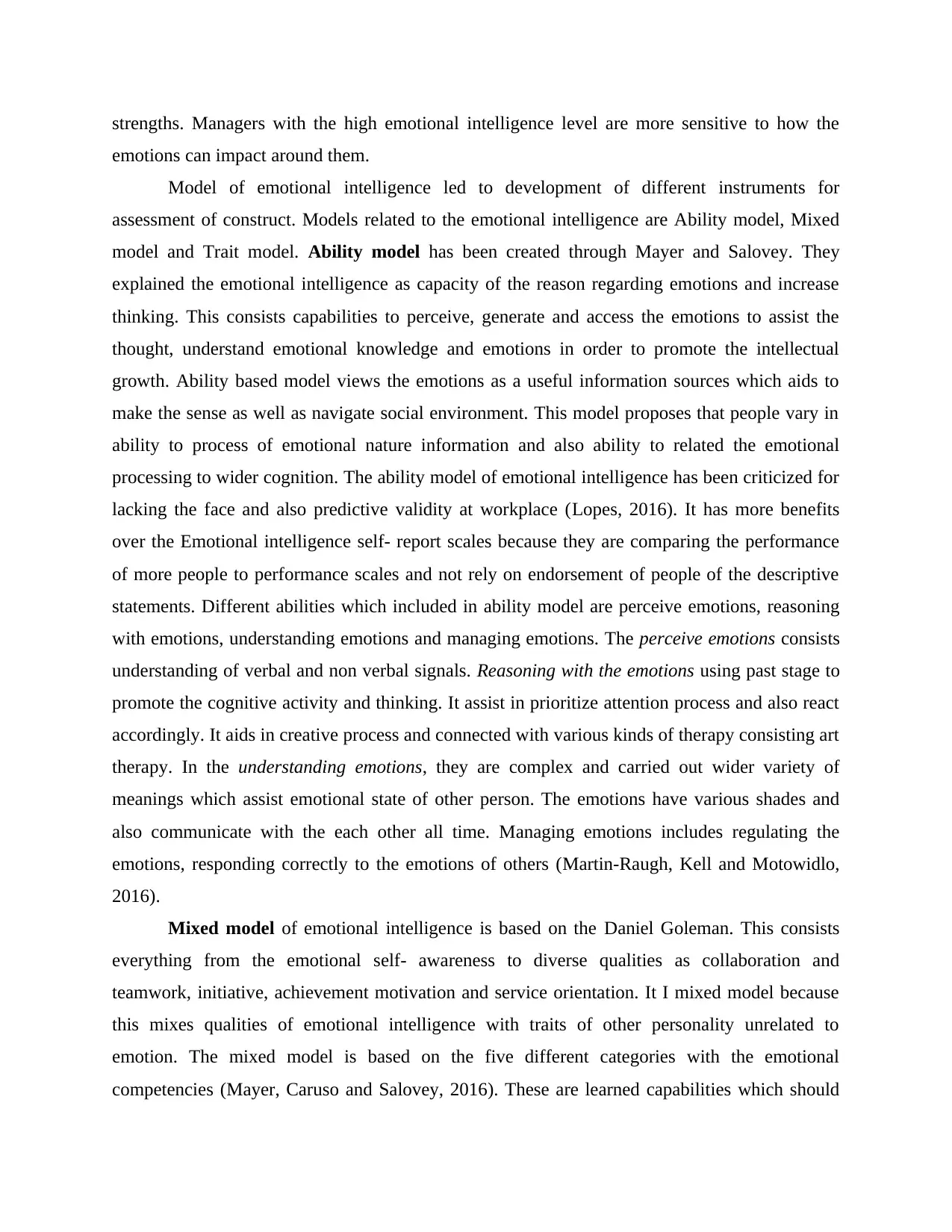
strengths. Managers with the high emotional intelligence level are more sensitive to how the
emotions can impact around them.
Model of emotional intelligence led to development of different instruments for
assessment of construct. Models related to the emotional intelligence are Ability model, Mixed
model and Trait model. Ability model has been created through Mayer and Salovey. They
explained the emotional intelligence as capacity of the reason regarding emotions and increase
thinking. This consists capabilities to perceive, generate and access the emotions to assist the
thought, understand emotional knowledge and emotions in order to promote the intellectual
growth. Ability based model views the emotions as a useful information sources which aids to
make the sense as well as navigate social environment. This model proposes that people vary in
ability to process of emotional nature information and also ability to related the emotional
processing to wider cognition. The ability model of emotional intelligence has been criticized for
lacking the face and also predictive validity at workplace (Lopes, 2016). It has more benefits
over the Emotional intelligence self- report scales because they are comparing the performance
of more people to performance scales and not rely on endorsement of people of the descriptive
statements. Different abilities which included in ability model are perceive emotions, reasoning
with emotions, understanding emotions and managing emotions. The perceive emotions consists
understanding of verbal and non verbal signals. Reasoning with the emotions using past stage to
promote the cognitive activity and thinking. It assist in prioritize attention process and also react
accordingly. It aids in creative process and connected with various kinds of therapy consisting art
therapy. In the understanding emotions, they are complex and carried out wider variety of
meanings which assist emotional state of other person. The emotions have various shades and
also communicate with the each other all time. Managing emotions includes regulating the
emotions, responding correctly to the emotions of others (Martin-Raugh, Kell and Motowidlo,
2016).
Mixed model of emotional intelligence is based on the Daniel Goleman. This consists
everything from the emotional self- awareness to diverse qualities as collaboration and
teamwork, initiative, achievement motivation and service orientation. It I mixed model because
this mixes qualities of emotional intelligence with traits of other personality unrelated to
emotion. The mixed model is based on the five different categories with the emotional
competencies (Mayer, Caruso and Salovey, 2016). These are learned capabilities which should
emotions can impact around them.
Model of emotional intelligence led to development of different instruments for
assessment of construct. Models related to the emotional intelligence are Ability model, Mixed
model and Trait model. Ability model has been created through Mayer and Salovey. They
explained the emotional intelligence as capacity of the reason regarding emotions and increase
thinking. This consists capabilities to perceive, generate and access the emotions to assist the
thought, understand emotional knowledge and emotions in order to promote the intellectual
growth. Ability based model views the emotions as a useful information sources which aids to
make the sense as well as navigate social environment. This model proposes that people vary in
ability to process of emotional nature information and also ability to related the emotional
processing to wider cognition. The ability model of emotional intelligence has been criticized for
lacking the face and also predictive validity at workplace (Lopes, 2016). It has more benefits
over the Emotional intelligence self- report scales because they are comparing the performance
of more people to performance scales and not rely on endorsement of people of the descriptive
statements. Different abilities which included in ability model are perceive emotions, reasoning
with emotions, understanding emotions and managing emotions. The perceive emotions consists
understanding of verbal and non verbal signals. Reasoning with the emotions using past stage to
promote the cognitive activity and thinking. It assist in prioritize attention process and also react
accordingly. It aids in creative process and connected with various kinds of therapy consisting art
therapy. In the understanding emotions, they are complex and carried out wider variety of
meanings which assist emotional state of other person. The emotions have various shades and
also communicate with the each other all time. Managing emotions includes regulating the
emotions, responding correctly to the emotions of others (Martin-Raugh, Kell and Motowidlo,
2016).
Mixed model of emotional intelligence is based on the Daniel Goleman. This consists
everything from the emotional self- awareness to diverse qualities as collaboration and
teamwork, initiative, achievement motivation and service orientation. It I mixed model because
this mixes qualities of emotional intelligence with traits of other personality unrelated to
emotion. The mixed model is based on the five different categories with the emotional
competencies (Mayer, Caruso and Salovey, 2016). These are learned capabilities which should
Paraphrase This Document
Need a fresh take? Get an instant paraphrase of this document with our AI Paraphraser
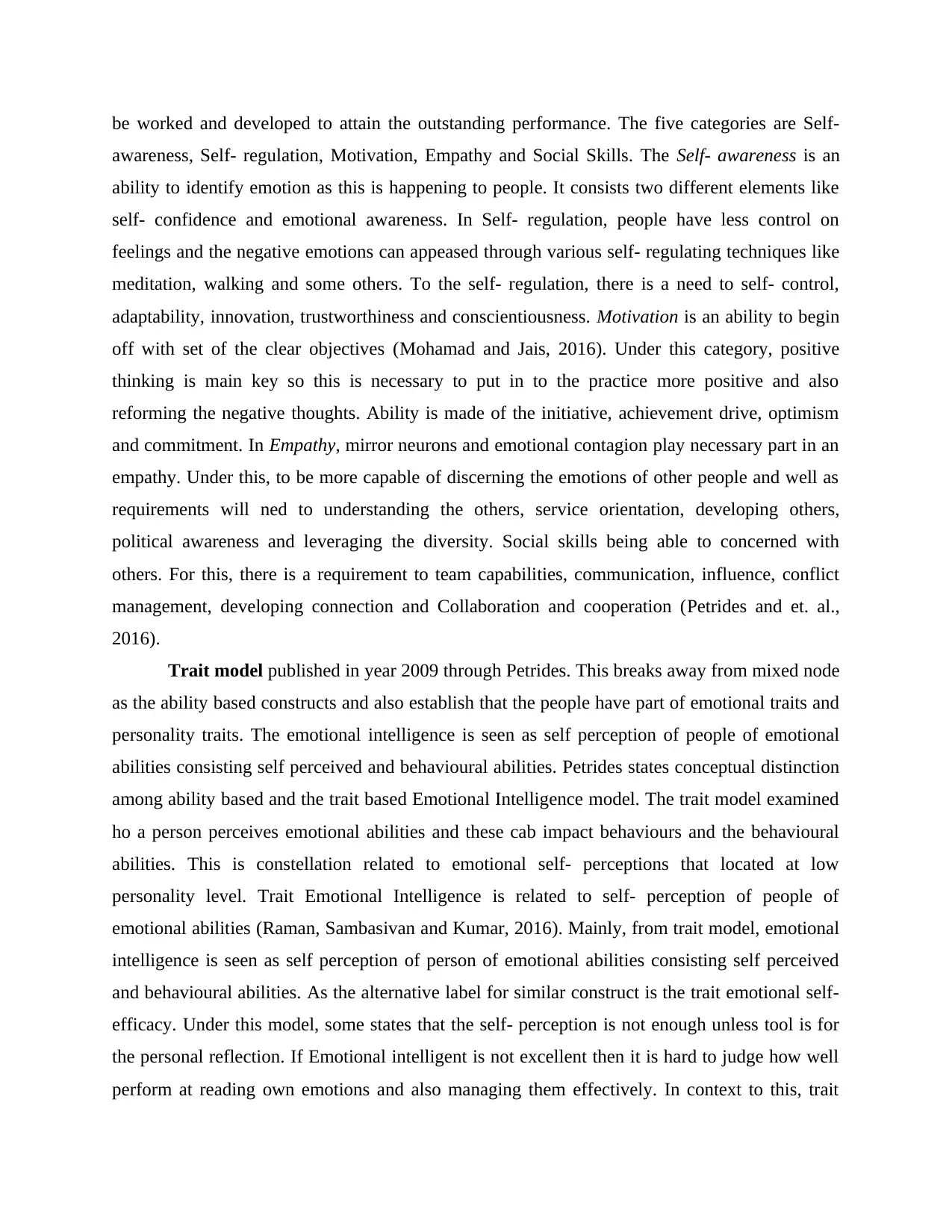
be worked and developed to attain the outstanding performance. The five categories are Self-
awareness, Self- regulation, Motivation, Empathy and Social Skills. The Self- awareness is an
ability to identify emotion as this is happening to people. It consists two different elements like
self- confidence and emotional awareness. In Self- regulation, people have less control on
feelings and the negative emotions can appeased through various self- regulating techniques like
meditation, walking and some others. To the self- regulation, there is a need to self- control,
adaptability, innovation, trustworthiness and conscientiousness. Motivation is an ability to begin
off with set of the clear objectives (Mohamad and Jais, 2016). Under this category, positive
thinking is main key so this is necessary to put in to the practice more positive and also
reforming the negative thoughts. Ability is made of the initiative, achievement drive, optimism
and commitment. In Empathy, mirror neurons and emotional contagion play necessary part in an
empathy. Under this, to be more capable of discerning the emotions of other people and well as
requirements will ned to understanding the others, service orientation, developing others,
political awareness and leveraging the diversity. Social skills being able to concerned with
others. For this, there is a requirement to team capabilities, communication, influence, conflict
management, developing connection and Collaboration and cooperation (Petrides and et. al.,
2016).
Trait model published in year 2009 through Petrides. This breaks away from mixed node
as the ability based constructs and also establish that the people have part of emotional traits and
personality traits. The emotional intelligence is seen as self perception of people of emotional
abilities consisting self perceived and behavioural abilities. Petrides states conceptual distinction
among ability based and the trait based Emotional Intelligence model. The trait model examined
ho a person perceives emotional abilities and these cab impact behaviours and the behavioural
abilities. This is constellation related to emotional self- perceptions that located at low
personality level. Trait Emotional Intelligence is related to self- perception of people of
emotional abilities (Raman, Sambasivan and Kumar, 2016). Mainly, from trait model, emotional
intelligence is seen as self perception of person of emotional abilities consisting self perceived
and behavioural abilities. As the alternative label for similar construct is the trait emotional self-
efficacy. Under this model, some states that the self- perception is not enough unless tool is for
the personal reflection. If Emotional intelligent is not excellent then it is hard to judge how well
perform at reading own emotions and also managing them effectively. In context to this, trait
awareness, Self- regulation, Motivation, Empathy and Social Skills. The Self- awareness is an
ability to identify emotion as this is happening to people. It consists two different elements like
self- confidence and emotional awareness. In Self- regulation, people have less control on
feelings and the negative emotions can appeased through various self- regulating techniques like
meditation, walking and some others. To the self- regulation, there is a need to self- control,
adaptability, innovation, trustworthiness and conscientiousness. Motivation is an ability to begin
off with set of the clear objectives (Mohamad and Jais, 2016). Under this category, positive
thinking is main key so this is necessary to put in to the practice more positive and also
reforming the negative thoughts. Ability is made of the initiative, achievement drive, optimism
and commitment. In Empathy, mirror neurons and emotional contagion play necessary part in an
empathy. Under this, to be more capable of discerning the emotions of other people and well as
requirements will ned to understanding the others, service orientation, developing others,
political awareness and leveraging the diversity. Social skills being able to concerned with
others. For this, there is a requirement to team capabilities, communication, influence, conflict
management, developing connection and Collaboration and cooperation (Petrides and et. al.,
2016).
Trait model published in year 2009 through Petrides. This breaks away from mixed node
as the ability based constructs and also establish that the people have part of emotional traits and
personality traits. The emotional intelligence is seen as self perception of people of emotional
abilities consisting self perceived and behavioural abilities. Petrides states conceptual distinction
among ability based and the trait based Emotional Intelligence model. The trait model examined
ho a person perceives emotional abilities and these cab impact behaviours and the behavioural
abilities. This is constellation related to emotional self- perceptions that located at low
personality level. Trait Emotional Intelligence is related to self- perception of people of
emotional abilities (Raman, Sambasivan and Kumar, 2016). Mainly, from trait model, emotional
intelligence is seen as self perception of person of emotional abilities consisting self perceived
and behavioural abilities. As the alternative label for similar construct is the trait emotional self-
efficacy. Under this model, some states that the self- perception is not enough unless tool is for
the personal reflection. If Emotional intelligent is not excellent then it is hard to judge how well
perform at reading own emotions and also managing them effectively. In context to this, trait
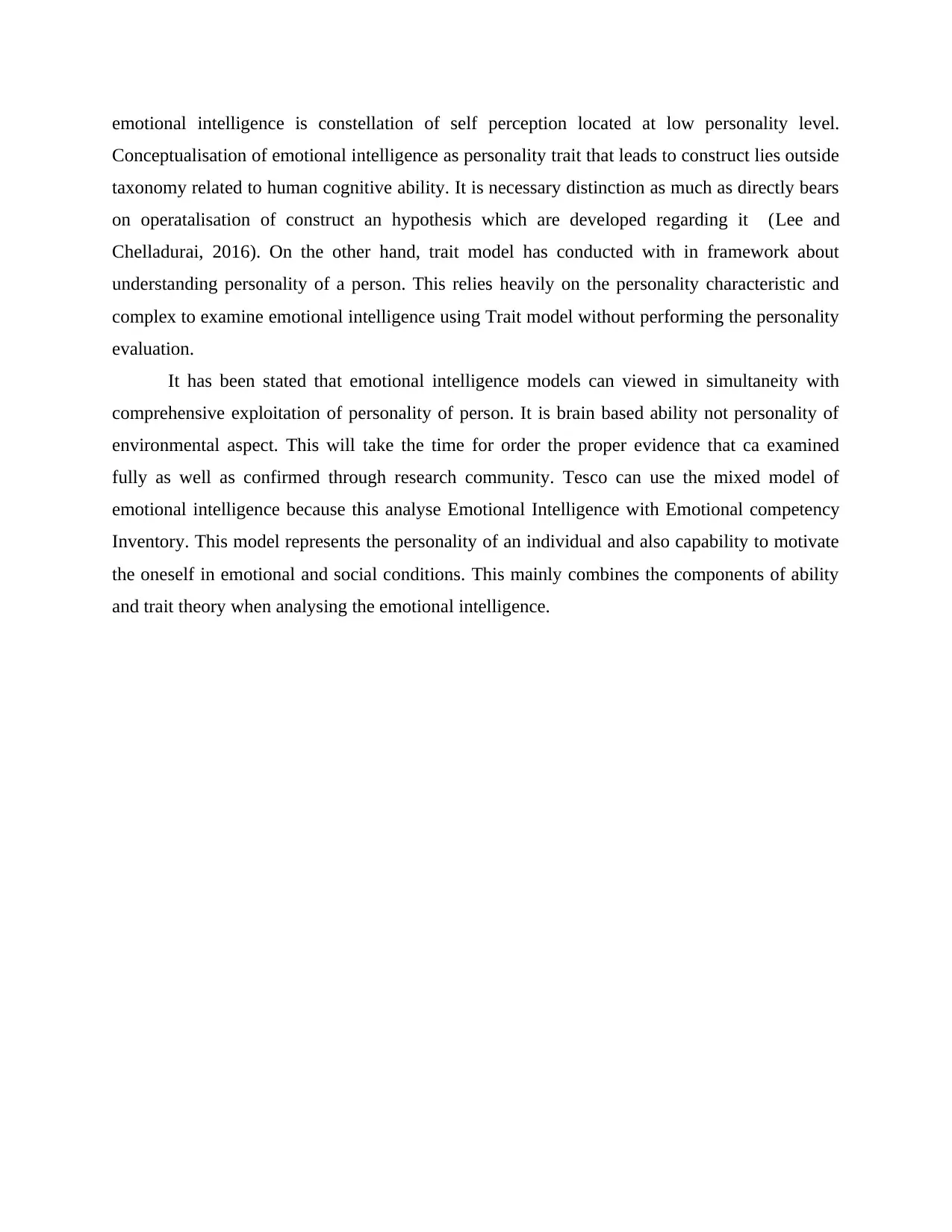
emotional intelligence is constellation of self perception located at low personality level.
Conceptualisation of emotional intelligence as personality trait that leads to construct lies outside
taxonomy related to human cognitive ability. It is necessary distinction as much as directly bears
on operatalisation of construct an hypothesis which are developed regarding it (Lee and
Chelladurai, 2016). On the other hand, trait model has conducted with in framework about
understanding personality of a person. This relies heavily on the personality characteristic and
complex to examine emotional intelligence using Trait model without performing the personality
evaluation.
It has been stated that emotional intelligence models can viewed in simultaneity with
comprehensive exploitation of personality of person. It is brain based ability not personality of
environmental aspect. This will take the time for order the proper evidence that ca examined
fully as well as confirmed through research community. Tesco can use the mixed model of
emotional intelligence because this analyse Emotional Intelligence with Emotional competency
Inventory. This model represents the personality of an individual and also capability to motivate
the oneself in emotional and social conditions. This mainly combines the components of ability
and trait theory when analysing the emotional intelligence.
Conceptualisation of emotional intelligence as personality trait that leads to construct lies outside
taxonomy related to human cognitive ability. It is necessary distinction as much as directly bears
on operatalisation of construct an hypothesis which are developed regarding it (Lee and
Chelladurai, 2016). On the other hand, trait model has conducted with in framework about
understanding personality of a person. This relies heavily on the personality characteristic and
complex to examine emotional intelligence using Trait model without performing the personality
evaluation.
It has been stated that emotional intelligence models can viewed in simultaneity with
comprehensive exploitation of personality of person. It is brain based ability not personality of
environmental aspect. This will take the time for order the proper evidence that ca examined
fully as well as confirmed through research community. Tesco can use the mixed model of
emotional intelligence because this analyse Emotional Intelligence with Emotional competency
Inventory. This model represents the personality of an individual and also capability to motivate
the oneself in emotional and social conditions. This mainly combines the components of ability
and trait theory when analysing the emotional intelligence.
⊘ This is a preview!⊘
Do you want full access?
Subscribe today to unlock all pages.

Trusted by 1+ million students worldwide
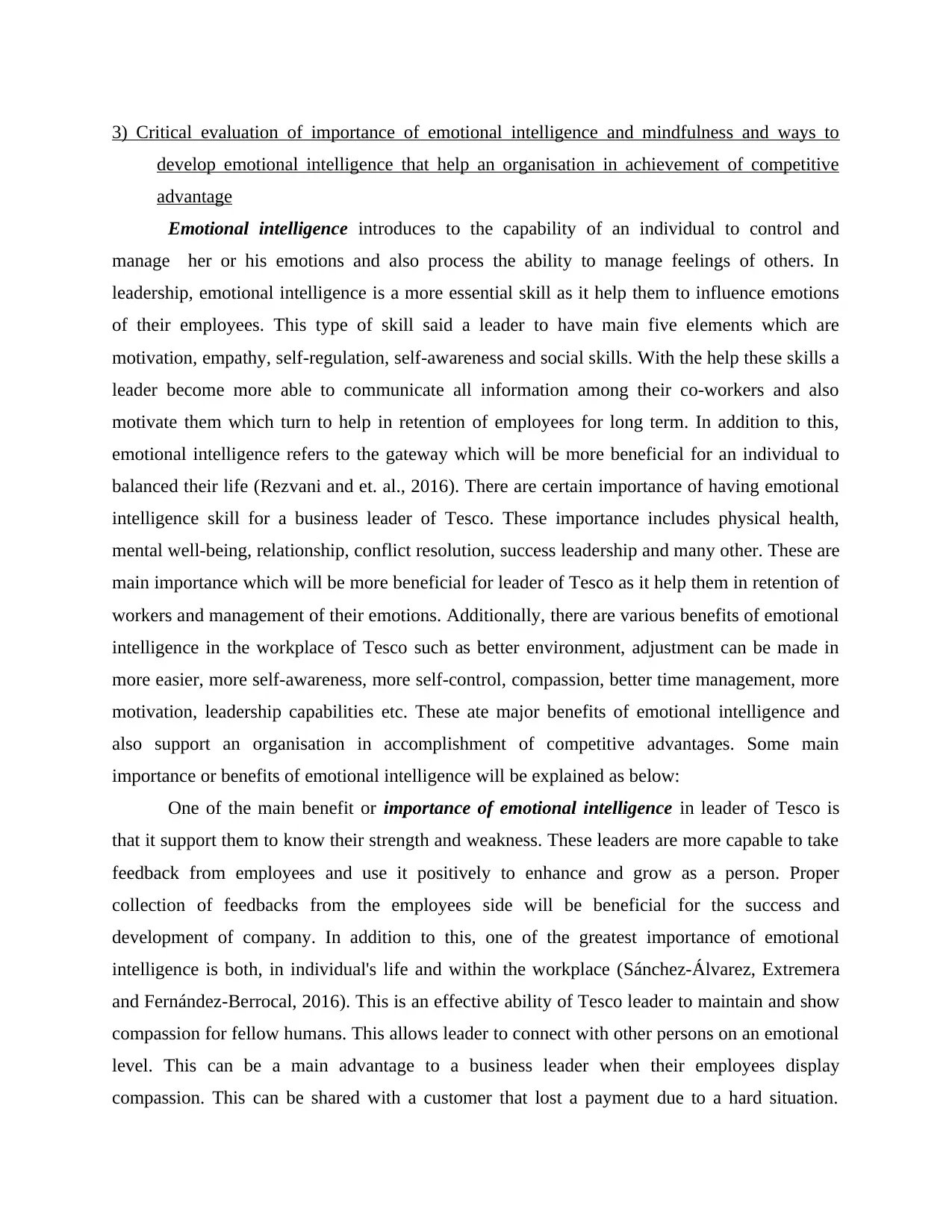
3) Critical evaluation of importance of emotional intelligence and mindfulness and ways to
develop emotional intelligence that help an organisation in achievement of competitive
advantage
Emotional intelligence introduces to the capability of an individual to control and
manage her or his emotions and also process the ability to manage feelings of others. In
leadership, emotional intelligence is a more essential skill as it help them to influence emotions
of their employees. This type of skill said a leader to have main five elements which are
motivation, empathy, self-regulation, self-awareness and social skills. With the help these skills a
leader become more able to communicate all information among their co-workers and also
motivate them which turn to help in retention of employees for long term. In addition to this,
emotional intelligence refers to the gateway which will be more beneficial for an individual to
balanced their life (Rezvani and et. al., 2016). There are certain importance of having emotional
intelligence skill for a business leader of Tesco. These importance includes physical health,
mental well-being, relationship, conflict resolution, success leadership and many other. These are
main importance which will be more beneficial for leader of Tesco as it help them in retention of
workers and management of their emotions. Additionally, there are various benefits of emotional
intelligence in the workplace of Tesco such as better environment, adjustment can be made in
more easier, more self-awareness, more self-control, compassion, better time management, more
motivation, leadership capabilities etc. These ate major benefits of emotional intelligence and
also support an organisation in accomplishment of competitive advantages. Some main
importance or benefits of emotional intelligence will be explained as below:
One of the main benefit or importance of emotional intelligence in leader of Tesco is
that it support them to know their strength and weakness. These leaders are more capable to take
feedback from employees and use it positively to enhance and grow as a person. Proper
collection of feedbacks from the employees side will be beneficial for the success and
development of company. In addition to this, one of the greatest importance of emotional
intelligence is both, in individual's life and within the workplace (Sánchez-Álvarez, Extremera
and Fernández-Berrocal, 2016). This is an effective ability of Tesco leader to maintain and show
compassion for fellow humans. This allows leader to connect with other persons on an emotional
level. This can be a main advantage to a business leader when their employees display
compassion. This can be shared with a customer that lost a payment due to a hard situation.
develop emotional intelligence that help an organisation in achievement of competitive
advantage
Emotional intelligence introduces to the capability of an individual to control and
manage her or his emotions and also process the ability to manage feelings of others. In
leadership, emotional intelligence is a more essential skill as it help them to influence emotions
of their employees. This type of skill said a leader to have main five elements which are
motivation, empathy, self-regulation, self-awareness and social skills. With the help these skills a
leader become more able to communicate all information among their co-workers and also
motivate them which turn to help in retention of employees for long term. In addition to this,
emotional intelligence refers to the gateway which will be more beneficial for an individual to
balanced their life (Rezvani and et. al., 2016). There are certain importance of having emotional
intelligence skill for a business leader of Tesco. These importance includes physical health,
mental well-being, relationship, conflict resolution, success leadership and many other. These are
main importance which will be more beneficial for leader of Tesco as it help them in retention of
workers and management of their emotions. Additionally, there are various benefits of emotional
intelligence in the workplace of Tesco such as better environment, adjustment can be made in
more easier, more self-awareness, more self-control, compassion, better time management, more
motivation, leadership capabilities etc. These ate major benefits of emotional intelligence and
also support an organisation in accomplishment of competitive advantages. Some main
importance or benefits of emotional intelligence will be explained as below:
One of the main benefit or importance of emotional intelligence in leader of Tesco is
that it support them to know their strength and weakness. These leaders are more capable to take
feedback from employees and use it positively to enhance and grow as a person. Proper
collection of feedbacks from the employees side will be beneficial for the success and
development of company. In addition to this, one of the greatest importance of emotional
intelligence is both, in individual's life and within the workplace (Sánchez-Álvarez, Extremera
and Fernández-Berrocal, 2016). This is an effective ability of Tesco leader to maintain and show
compassion for fellow humans. This allows leader to connect with other persons on an emotional
level. This can be a main advantage to a business leader when their employees display
compassion. This can be shared with a customer that lost a payment due to a hard situation.
Paraphrase This Document
Need a fresh take? Get an instant paraphrase of this document with our AI Paraphraser
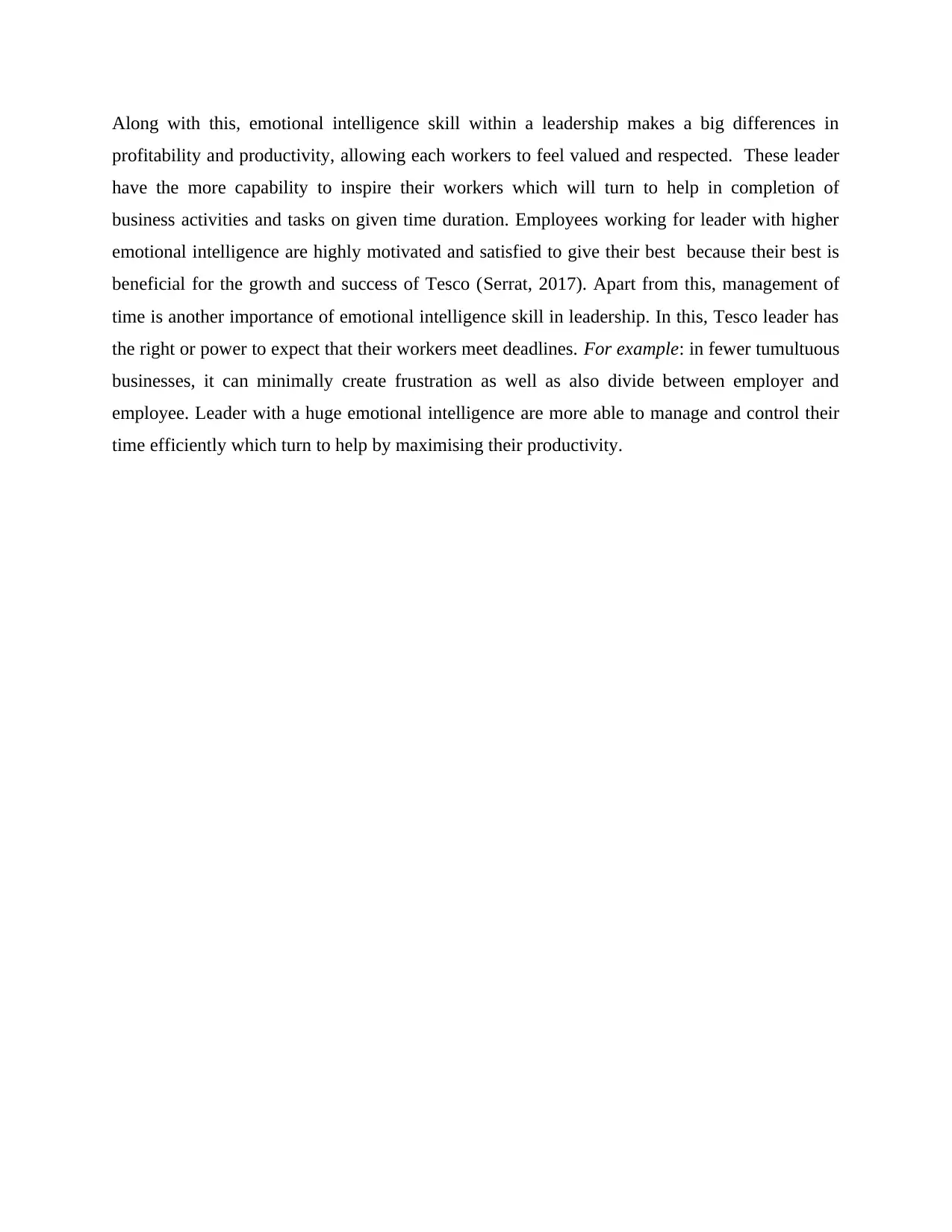
Along with this, emotional intelligence skill within a leadership makes a big differences in
profitability and productivity, allowing each workers to feel valued and respected. These leader
have the more capability to inspire their workers which will turn to help in completion of
business activities and tasks on given time duration. Employees working for leader with higher
emotional intelligence are highly motivated and satisfied to give their best because their best is
beneficial for the growth and success of Tesco (Serrat, 2017). Apart from this, management of
time is another importance of emotional intelligence skill in leadership. In this, Tesco leader has
the right or power to expect that their workers meet deadlines. For example: in fewer tumultuous
businesses, it can minimally create frustration as well as also divide between employer and
employee. Leader with a huge emotional intelligence are more able to manage and control their
time efficiently which turn to help by maximising their productivity.
profitability and productivity, allowing each workers to feel valued and respected. These leader
have the more capability to inspire their workers which will turn to help in completion of
business activities and tasks on given time duration. Employees working for leader with higher
emotional intelligence are highly motivated and satisfied to give their best because their best is
beneficial for the growth and success of Tesco (Serrat, 2017). Apart from this, management of
time is another importance of emotional intelligence skill in leadership. In this, Tesco leader has
the right or power to expect that their workers meet deadlines. For example: in fewer tumultuous
businesses, it can minimally create frustration as well as also divide between employer and
employee. Leader with a huge emotional intelligence are more able to manage and control their
time efficiently which turn to help by maximising their productivity.
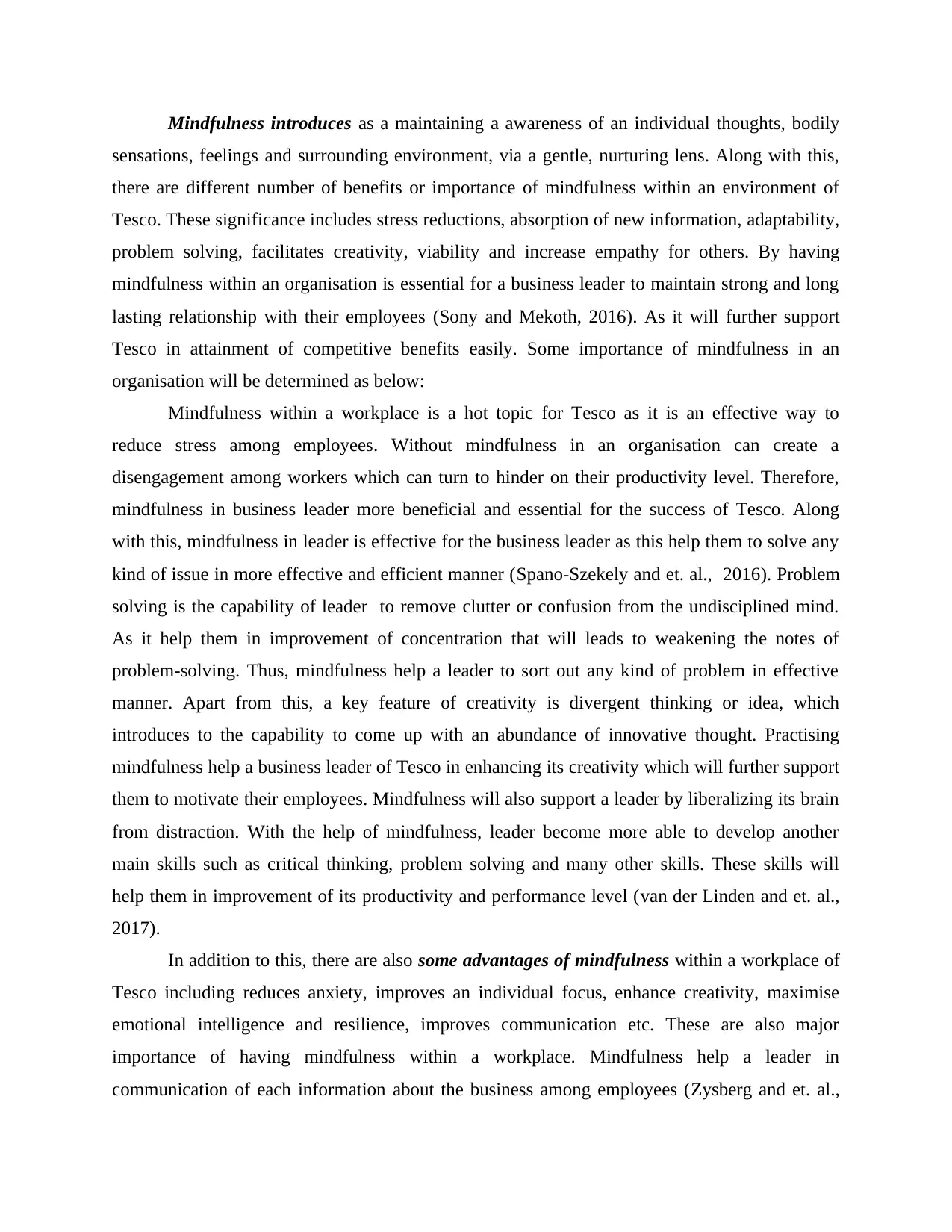
Mindfulness introduces as a maintaining a awareness of an individual thoughts, bodily
sensations, feelings and surrounding environment, via a gentle, nurturing lens. Along with this,
there are different number of benefits or importance of mindfulness within an environment of
Tesco. These significance includes stress reductions, absorption of new information, adaptability,
problem solving, facilitates creativity, viability and increase empathy for others. By having
mindfulness within an organisation is essential for a business leader to maintain strong and long
lasting relationship with their employees (Sony and Mekoth, 2016). As it will further support
Tesco in attainment of competitive benefits easily. Some importance of mindfulness in an
organisation will be determined as below:
Mindfulness within a workplace is a hot topic for Tesco as it is an effective way to
reduce stress among employees. Without mindfulness in an organisation can create a
disengagement among workers which can turn to hinder on their productivity level. Therefore,
mindfulness in business leader more beneficial and essential for the success of Tesco. Along
with this, mindfulness in leader is effective for the business leader as this help them to solve any
kind of issue in more effective and efficient manner (Spano-Szekely and et. al., 2016). Problem
solving is the capability of leader to remove clutter or confusion from the undisciplined mind.
As it help them in improvement of concentration that will leads to weakening the notes of
problem-solving. Thus, mindfulness help a leader to sort out any kind of problem in effective
manner. Apart from this, a key feature of creativity is divergent thinking or idea, which
introduces to the capability to come up with an abundance of innovative thought. Practising
mindfulness help a business leader of Tesco in enhancing its creativity which will further support
them to motivate their employees. Mindfulness will also support a leader by liberalizing its brain
from distraction. With the help of mindfulness, leader become more able to develop another
main skills such as critical thinking, problem solving and many other skills. These skills will
help them in improvement of its productivity and performance level (van der Linden and et. al.,
2017).
In addition to this, there are also some advantages of mindfulness within a workplace of
Tesco including reduces anxiety, improves an individual focus, enhance creativity, maximise
emotional intelligence and resilience, improves communication etc. These are also major
importance of having mindfulness within a workplace. Mindfulness help a leader in
communication of each information about the business among employees (Zysberg and et. al.,
sensations, feelings and surrounding environment, via a gentle, nurturing lens. Along with this,
there are different number of benefits or importance of mindfulness within an environment of
Tesco. These significance includes stress reductions, absorption of new information, adaptability,
problem solving, facilitates creativity, viability and increase empathy for others. By having
mindfulness within an organisation is essential for a business leader to maintain strong and long
lasting relationship with their employees (Sony and Mekoth, 2016). As it will further support
Tesco in attainment of competitive benefits easily. Some importance of mindfulness in an
organisation will be determined as below:
Mindfulness within a workplace is a hot topic for Tesco as it is an effective way to
reduce stress among employees. Without mindfulness in an organisation can create a
disengagement among workers which can turn to hinder on their productivity level. Therefore,
mindfulness in business leader more beneficial and essential for the success of Tesco. Along
with this, mindfulness in leader is effective for the business leader as this help them to solve any
kind of issue in more effective and efficient manner (Spano-Szekely and et. al., 2016). Problem
solving is the capability of leader to remove clutter or confusion from the undisciplined mind.
As it help them in improvement of concentration that will leads to weakening the notes of
problem-solving. Thus, mindfulness help a leader to sort out any kind of problem in effective
manner. Apart from this, a key feature of creativity is divergent thinking or idea, which
introduces to the capability to come up with an abundance of innovative thought. Practising
mindfulness help a business leader of Tesco in enhancing its creativity which will further support
them to motivate their employees. Mindfulness will also support a leader by liberalizing its brain
from distraction. With the help of mindfulness, leader become more able to develop another
main skills such as critical thinking, problem solving and many other skills. These skills will
help them in improvement of its productivity and performance level (van der Linden and et. al.,
2017).
In addition to this, there are also some advantages of mindfulness within a workplace of
Tesco including reduces anxiety, improves an individual focus, enhance creativity, maximise
emotional intelligence and resilience, improves communication etc. These are also major
importance of having mindfulness within a workplace. Mindfulness help a leader in
communication of each information about the business among employees (Zysberg and et. al.,
⊘ This is a preview!⊘
Do you want full access?
Subscribe today to unlock all pages.

Trusted by 1+ million students worldwide
1 out of 18
Related Documents
Your All-in-One AI-Powered Toolkit for Academic Success.
+13062052269
info@desklib.com
Available 24*7 on WhatsApp / Email
![[object Object]](/_next/static/media/star-bottom.7253800d.svg)
Unlock your academic potential
Copyright © 2020–2026 A2Z Services. All Rights Reserved. Developed and managed by ZUCOL.





